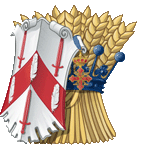The Lordship and
Manor of Rushton or Rushton James (Staffordshire)
| Location | |
| OS County Series 6 inches to 1 mile sheets | 3SE |
| OS National Grid 6 inches to 1 mile sheet | SJ96SW |
| OS National Grid reference | SJ930615 |
| Church of England | |
| Ancient Parish | Leek, St Edward the Confessor |
| Ancient Chapelries | Rushton Spencer, St Lawrence |
| Local Government | |
| Manor |
Rushton Overlordship -
Rushton James |
| Civil Parish | Rushton James (1866-1934); Rushton (1934-date) |
| Hundred | Totmonslow North |
| Poor Law Union | Leek Poor Law Union (1836-1930) |
| District Council | Leek Rural District (1894-1974); Staffordshire Moorlands District (1974-date) |
| County Council |
Staffordhire County Council |
| Parliamentary Representation | |
| Parliamentary Constituency (to 1974) | Northern Staffordshire (1832-1867); North
Staffordshire (1867-1885); Leek (1885-1974);
Staffordshire Moorlands. |
In British society, the Lordship of a Manor is a lordship originating in the feudal system of manorialism. In modern England and Wales it is recognised as a form of property, one of three elements of a manor that may exist separately or be combined and may be held in moieties:
1 the title (with origins in the Roman concept of dignitas);
2 the manorial, consisting of the manor and its land; and
3 the seignory, rights granted to the holder of the manor.
A title similar to such a lordship is known in French as Seigneur du Manoir, Welsh as Breyr, Gutsherr in German, godsherre in Norwegian and Swedish, ambachtsheer in Dutch and signore or vassallo in Italian. In Italy, particularly in the Kingdom of Sicily until 1812, the feudal title signore was used; like the English title, it came into wide use in Norman times, from the French seigneur.
The owner of a lordship of the manor can be described as [Personal Name], Lord/Lady of the Manor of [Placename], sometimes shortened to Lord or Lady of [Placename].
A manorial lordship is not an aristocratic title, but a semi-extinct form of landed property. Lordship in this sense is a synonym for ownership, although this ownership involved an historic legal jurisdiction in the form of the Court baron. The journal Justice of the Peace Local Government Law advises that the position is unclear as to whether a lordship of a manor is a title of honour or a dignity, as this is yet to be tested by the courts. Technically, Lords of Manors are barons, or freemen; however, they do not use the term as a title. John Selden in his esteemed work Titles of Honour writes, "The word Baro (Latin for Baron) hath been also so much communicated, that not only all Lords of Mannors have been from antient time, and are at this day called sometimes Barons (as in the stile of their Court Barons, which is Curia Baronis, &c. And I have read hors de son Barony in a barr to an Avowry for hors de son fee) But also the Judges of the Exchequer have it from antient time fixed on them."

